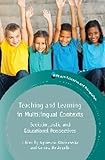Teaching and Learning in Multilingual Contexts : Sociolinguistic and Educational Perspectives / ed. by Agnieszka Otwinowska, Gessica De Angelis.
Material type: TextSeries: Bilingual Education & BilingualismPublisher: Bristol ; Blue Ridge Summit : Multilingual Matters, [2014]Copyright date: ©2014Description: 1 online resource (272 p.)Content type:
TextSeries: Bilingual Education & BilingualismPublisher: Bristol ; Blue Ridge Summit : Multilingual Matters, [2014]Copyright date: ©2014Description: 1 online resource (272 p.)Content type: - 9781783091256
- 9781783091263
- 370.117 23
- LC3715 .T45 2014
- LC3715 .T45 2014
- online - DeGruyter
- Issued also in print.
| Item type | Current library | Call number | URL | Status | Notes | Barcode | |
|---|---|---|---|---|---|---|---|
 eBook
eBook
|
Biblioteca "Angelicum" Pont. Univ. S.Tommaso d'Aquino Nuvola online | online - DeGruyter (Browse shelf(Opens below)) | Online access | Not for loan (Accesso limitato) | Accesso per gli utenti autorizzati / Access for authorized users | (dgr)9781783091263 |
Browsing Biblioteca "Angelicum" Pont. Univ. S.Tommaso d'Aquino shelves, Shelving location: Nuvola online Close shelf browser (Hides shelf browser)

|

|

|

|

|

|

|
||
| online - DeGruyter English Language Teachers on the Discursive Faultlines : Identities, Ideologies and Pedagogies / | online - DeGruyter Language Strategies for Trilingual Families : Parents' Perspectives / | online - DeGruyter Capitalizing on Language Learners' Individuality : From Premise to Practice / | online - DeGruyter Teaching and Learning in Multilingual Contexts : Sociolinguistic and Educational Perspectives / | online - DeGruyter Multilingual Aspects of Signed Language Communication and Disorder / | online - DeGruyter Multiple Perspectives on the Self in SLA / | online - DeGruyter Sociocultural Theory and L2 Instructional Pragmatics / / |
Frontmatter -- Contents -- Contributors -- Introduction: Towards Education for Multilingualism -- Part 1: Multilingualism in Education: Conceptual Issues and Sociolinguistic Perspectives -- 1. Problems in Defining the Concepts of L1, L2 and L3 -- 2. Analyzing Linguistic Landscapes. A Diachronic Study of Multilingualism in Poland -- 3. Rethinking Multilingualism: Complex Identities, Representations and Practices of Multilingual Student Teachers Moving through Plurilingual Times in University French Language Teacher Education Programs -- 4. Analysing Prospective Teachers' Attitudes towards Three Languages in Two Different Sociolinguistic and Educational Settings -- 5. EFL Teacher Trainees and European Goals of Multilingualism and Plurilingualism. A Survey of Attitudes in Poland and Croatia -- 6. Rethinking Urban Schools - A Sociolinguistic Analysis of Multilingualism in Frankfurt/M, Germany -- Part 2: Students and Teachers in the Multilingual Classroom -- 7. The Role of Age on the Development of Written Competence in L4 English: Evidence From a Spanish/German CLIL Context -- 8. The Role of External Consultancy in Supporting Multilingual CLIL Teams and in Shaping School Pedagogical Culture: The Case of S. Giacomo di Laives/St Jakob Leifers (Italy) -- 9. Discourse on Multilingualism, Language Competence, Use and Attitudes in German-English Bilingual Vocational Schools in Switzerland -- 10. Developing Metalinguistic Awareness in L3 German Classrooms -- 11. L3, L1 or L0? Heritage-Language Students as Third-Language Learners -- Epilogue. Education for Multilingualism: From Political Discourse to Classroom Applications
restricted access online access with authorization star
http://purl.org/coar/access_right/c_16ec
It is clearly illogical to search for one good, universal solution for multilingual education when educational contexts differ so widely due to demographic and social factors. The situation is further complicated by the motivations of learners and teachers, and by attitudes towards multilingualism and 'otherness'. The studies in this volume seek to investigate not only whether certain solutions and practices are 'good', but also when and for whom they make sense. The book covers a wide range of Western multilingual contexts, and uncovers common themes and practices, shared aims and preoccupations, and often similar solutions, within seemingly diverse contexts. In addition to chapters based on empirical data, this book offers theoretical contributions in the shape of a discussion of the appropriateness of L1-Ln terminology when discussing complex multilingual realities, and looks at how the age factor works in classroom settings.
Issued also in print.
Mode of access: Internet via World Wide Web.
In English.
Description based on online resource; title from PDF title page (publisher's Web site, viewed 24. Apr 2022)


